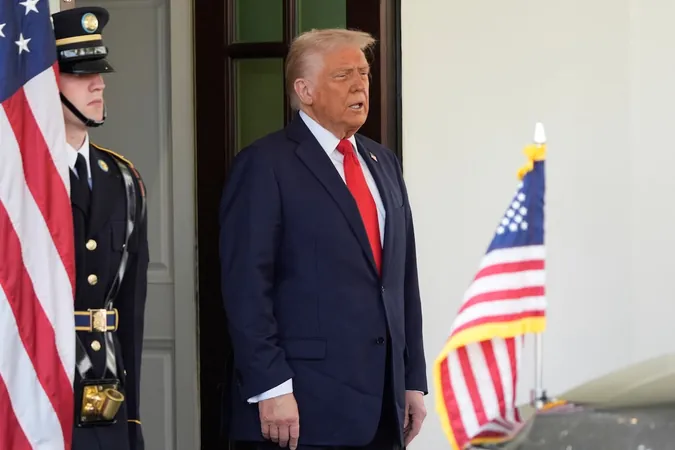
Trump's Unexpected Moves: Tariff Relief for Automakers and New Levies on Tech and Pharma
2025-04-15
Author: Emily
Trump's Trade Strategy Takes a Twisting Turn
In a surprising announcement, U.S. President Donald Trump is considering temporary tariff relief for automakers to give them time to adjust their supply chains. This potential reprieve comes amidst the administration's push to impose new tariffs on semiconductor and pharmaceutical imports.
Flexibility for Auto Manufacturers
At a press briefing in the White House, Trump expressed his willingness to assist auto manufacturers, particularly those sourcing parts from Canada and Mexico. He stated, "They need a little bit of time to reorganize supply chains to produce more in the United States." Although specifics were scarce, this hints at a significant shift in trade policy.
Tech Products' Temporary Exemptions
Recently, the Trump administration exempted various technology products, including smartphones and tablets, from a steep 125% tariff initially set on Chinese imports. Over the weekend, Trump clarified that these products will be covered under planned tariffs on semiconductors instead, showing his ever-evolving stance on trade issues.
A Game of Tariff Chess
When questioned about potential exemptions for tech products, Trump hinted that more changes could be on the horizon. His statement reflects his approach of flexibility, saying, "I’m a very flexible person. I don’t change my mind, but I’m flexible." This unpredictability has left many businesses and trading partners in the dark.
National Security Claims Underpin New Tariffs
White House spokesman Kush Desai confirmed that the Department of Commerce is investigating the impact of semiconductor and pharmaceutical imports under Section 232 of the Trade Expansion Act. This legal route justifies tariffs on grounds of national security, a tactic Trump has employed with existing tariffs on cars, steel, and aluminum.
Pharmaceutical Tariffs Could Hit Hard
Trump articulated his goal to encourage drug manufacturers to relocate to the U.S., asserting that high tariffs on pharmaceuticals would expedite this process. Such moves have drawn criticism, considering that American patients already face some of the highest drug prices in the world.
Impacts on the American Economy and Trade Relations
Since Trump re-entered office, he has used tariffs as a core part of his economic strategy but has often altered his approach. In April, he announced sweeping tariffs that affected countries worldwide, only to reverse course soon after. Industry leaders express concern over this erratic decision-making, especially in the auto sector, which is deeply intertwined with Canadian and Mexican production.
Industry Leaders Respond
David Adams, from the Global Automakers of Canada, challenged the legality of 25% tariffs on Canadian imports under the USMCA. Others in the industry have noted that Trump's latest considerations reflect an acknowledgment of the global interdependence of auto manufacturing.
Temporary Solutions Amid Ongoing Challenges
As Ontario experiences layoffs and plant shutdowns due to these tariffs, industry leaders argue that tariffs are seen as a short-term fix rather than a sustainable strategy. The looming pharmaceutical tariffs could further complicate matters, threatening access to affordable medications for American consumers.
Potential Legal Challenges Ahead
Trade experts caution that Trump's plans to use Section 232 could spark legal challenges, especially if implemented without thorough investigations. As the administration continues to navigate these murky waters, the business world watches closely, waiting for clarity amid the chaos.









 Brasil (PT)
Brasil (PT)
 Canada (EN)
Canada (EN)
 Chile (ES)
Chile (ES)
 Česko (CS)
Česko (CS)
 대한민국 (KO)
대한민국 (KO)
 España (ES)
España (ES)
 France (FR)
France (FR)
 Hong Kong (EN)
Hong Kong (EN)
 Italia (IT)
Italia (IT)
 日本 (JA)
日本 (JA)
 Magyarország (HU)
Magyarország (HU)
 Norge (NO)
Norge (NO)
 Polska (PL)
Polska (PL)
 Schweiz (DE)
Schweiz (DE)
 Singapore (EN)
Singapore (EN)
 Sverige (SV)
Sverige (SV)
 Suomi (FI)
Suomi (FI)
 Türkiye (TR)
Türkiye (TR)
 الإمارات العربية المتحدة (AR)
الإمارات العربية المتحدة (AR)